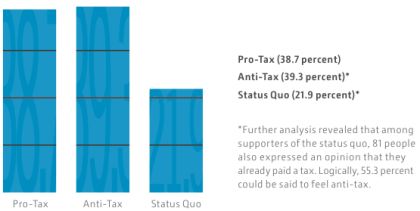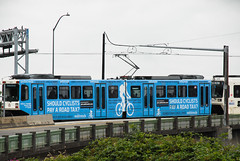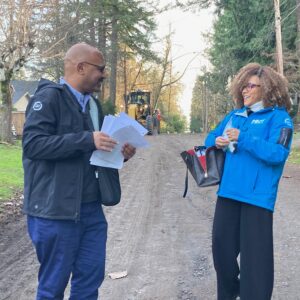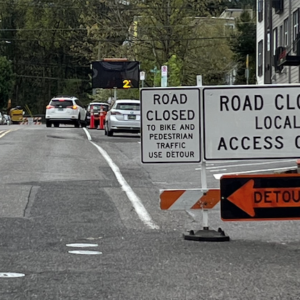Back in July a local web marketing company Webtrends wrapped a MAX train with the question, “Should cyclists pay a road tax?” I wasn’t too thrilled with it and made my concerns clear in an editorial about the campaign.
The campaign stirred quite a bit of debate and news coverage about the issue. Now Webtrends has released a follow-up report and analysis about their findings from the campaign. The company’s original plan was to create a follow-up MAX ad sharing the results of their findings (the ad in the photo above is still running).
However, according to report author and Webtrends’ Senior Manager for Social Media Marketing Justin Kistner, “The sides are too polarized and the topic is too complex for a Max ad to help advance the discussion or adequately educate people on both sides.”
Instead, Kistner has put together a six-page report on the campaign which they plan on posted to their website later today (download it here if you don’t want to wait).
Of the 946 comments tracked in the campaign (through blog comments, mentions on Twitter, etc…) more than half (55.3%) of the responses that actually answered the question were against the idea of having “cyclists” pay a road tax. Of the anti-tax respondents, the number one reason (67%) given was that people who ride bicycles already pay taxes that fund roads (those folks might want to check out the new jerseys at UK-based IPayRoadTax.com.)
Among the pro-tax respondents, the number one reason (44%) was along the lines of “The bike-only infrastructure only benefits people who cycle, so people who cycle should pay for it.”

Interestingly, more than half of the responses to the campaign did not event answer the “Should cyclists pay a road tax?” question. Of those “non-answer” respondents, 21% said the question was biased and 9% insulted Webtrends for asking it.
According to the report’s conclusion,
“The primary conflict among commenters came down to this: Does cycling infrastructure benefit only cyclists, or all road users? And thus, who should pay for it?”
Based on their analysis, Webtrends came up with three recommendations that “interested parties should address”:
- more education about how roads are funded is needed (“The amount of misinformation shared throughout this campaign was staggering”),
- more explanation of how bike infrastructure benefits all road users (“..it seems necessary to explain these shared benefits [less congestion, safer streets] to those who believe cyclists should pay for cycling-only infrastructure”),
- too many people riding bikes ride dangerously (“If these perceptions are deemed to have statistical merit, there may be a need to increase bike safety training within communities or schools”).
I stand by my criticisms of Webtrends’ approach to this entire campaign. However, despite those feelings, their analysis can be a useful tool for advocates and planners looking for guidance on this issue and it’s always interesting to hear what someone outside the bike bubble thinks about these hot-button issues.








Thanks for reading.
BikePortland has served this community with independent community journalism since 2005. We rely on subscriptions from readers like you to survive. Your financial support is vital in keeping this valuable resource alive and well.
Please subscribe today to strengthen and expand our work.
I would be happy to pay a cyclist’s tax if it went towards improving the bike infrastructure instead of being lumped together with other road funds.
Also — Parent’s should pay for their children’s education. I don’t know why I should be expected to pay since I don’t have kids.
what a f-ing joke. so, since 55% of people say ‘cyclists shouldn’t pay a tax’ (the answer those jerks didn’t want to hear), they decided it was ‘too controversial to put on the side of the max’, unlike their original campaign. what a bunch of asses. BOYCOTT WEBTRENDS!
I think another thing that would be great to add to that, is how many of our roads operate at way under capacity most of the time, and therefore the dedication of some of the road space to cycling or pedestrian infrastructure doesn’t really make much difference.
Though I agree with you still that the campaign was a bit divisive and inflammatory, they do seem to have come up with some good conclusions, and I’m honestly surprised that less than half of people thought “cyclists” should pay extra taxes.
Maybe hopefully that means that we’re making headway into the idea that “cyclists” are just people who happen to ride bikes, not some lawless, fringe rebel group. Or maybe it just means more people who ride bikes were aware of and commented on the issue. Who knows.
Solid Gold, read it again, 55% were AGAINST the bike tax!!
Larey #1
Everyone benefits from an educated population. Educated persons get higher paying jobs and support higher technology employers. This spreads througout the economy. Now back to bicycles
This has always been a classic case of introducing bias into a survey question. This is forgivable if its a community college statistics project, but pretty lame coming from folks who know all the ins and outs. When 21% of respondents object due to bias, you can bet its biased.
They did not ask: Are you aware that X% of car infrastructure is paid for with general taxes, with X% paid with gas taxes? Then a follow up question about whether cyclists already pay their fair share might yield some data.
Big news department. People don’t want to pay taxes.
Their analysis is pretty much spot on though.
Aren’t bike facilities something like 1% of transportation spending in Portland? I bet administrative overhead costs more… why don’t they raise that question.
Of course, that wouldn’t get as much “buzz.”
“The sides are too polarized and the topic is too complex for a Max ad to help advance the discussion or adequately educate people on both sides.”
They didn’t know this before they put the first series of ads on the max? Webtrends stirred the pot for their own gain and then bailed on it when they’d gotten their publicity.
Jedi, read it again, Solid Gold CORRECTLY referenced the story!!
And I’m pretty sure Larey was being sarcastic with that education bit. Maybe I’m wrong…
Bob, I’m pretty sure larry was kidding.
And Jedi, S. G. did get it right the first time…
Larey, I sure as hell don’t want any of my tax dollars going to anything you benefit from. I don’t even want my tax dollars going towards the specific infrastructure segments that you use because I don’t agree with you. I should be able to pick and choose how my tax dollars are spent in order to have the most detriment towards you, simply because I don’t personally get any benefit from your existence.
Get real.
“too many people riding bikes ride dangerously (”If these perceptions are deemed to have statistical merit, there may be a need to increase bike safety training within communities or schools”).”
Like drivers who break the law to an unreasonable extent, such as plowing through a stop sign, I think people who ride bike dangerously (such as not looking or slowing down going through a stop sign) should be ticketed, many of these people are already “educated” about the road, and their behavior makes the road unsafe for everyone else.
There are eleventybillion more bad drivers than there are bad bikers.
Thanks.
I think another, vastly more important question is, “Should road users pay the full costs of their road usage”.
Because if one digs into the taxes used for roads, only about 50% of the population pays for it, while the other 50% get to drive for “free”. Meanwhile the conversation gets all heated about such a small amount of $ paid for cycling infrastructure when half the population is baring the MASSIVE cost of auto based infrastructure (and of course the massive debt incurred is relative to taxes paid too – I would assume).
But I digress, I’ve wagered on about it at Transit Slueth a million times.
The other point, and I really stand by that finding, is the fact that people are generally clueless as to how roads are actually paid for. i.e. The MASSIVE subsidies that the roads require.
Right on Adron!
Most who ride bicycles also drive. Therefore maybe we should also ask, What is the value of their cars? How much do they spend on gas? How many miles do cyclists drive?
My guess is the taxes they pay on the car, auto registration, and gas pay their fare share of the transportation infrastructure costs.
Right on Adron!
Most who ride bicycles also drive. Therefore maybe we should also ask, What is the value of their cars? How much do they spend on gas? How many miles do cyclists drive?
My guess is the taxes they pay on the car, auto registration, and gas pay their fare share of the transportation infrastructure costs.
I think we would have to have a “road tax” before anyone could pay it.
Is there a website or reliable source that shows how bike lanes/infrastructure is funded? I’ve always wanted to see this so that I can have others refer to it to help clear up the confusion.
Wait– Did I read that right? The ad is still running on the trains?
Bicyclists are expressly excluded from using about 46,000 miles of US Interstate highways. Those highways have cost, to date, nearly a Trillion dollars to build and maintain. Guess how much money has been collected from gasoline taxes that have gone to the DOT? About the same.
So you want bicyclists to be excluded from roads that have been paid for with gas taxes? Your wish has been granted!
The people who want cyclists to pay road taxes think we’re getting a free ride – enjoying infrastructure paid for by gas taxes. That assumption is false. Dollar for dollar, cyclists are not allowed to use the roads that gas taxes have paid for. The rest of the public infrastructure is paid for mostly by sales taxes which cyclists pay for about the same as motorists.
LOL @ #2’s call to “BOYCOTT WEBTRENDS.” Kind of like a call to action on a consumer website to “BOYCOTT SAP”.
How many of the people reading this are actually in a position to boycott Webtrends?
If the BTA would conduct a comprehensive study of exactly how much of tax money above and beyond the gas tax goes to fund roads in this state, what percentage of the total roads/highways budget is paid for by the gas tax, and how the rest of said budget is funded, etc., I would rejoin at my previous level. If it was something they would also heavily publicize, I’d rejoin at an increased level.
If some other organization did this, I’d go and support them.
The only way we’re going to put this “cyclist don’t pay for roads” crap to rest is via cold, hard numbers. Sure, there will always be something else, but I am tired of this topic and of constantly being accused of “not paying taxes” because I ride a bicycle. (God, I wish.)
One day, at work, I looked down and noticed my fly was down. I had been in numerous meetings that morning and was concerned that everyone must have noticed or seen “things” they wish they hadn’t, but not said anything to me. In a panic, after zipping up my fly, I sent out an email to everyone in my dept apologizing and promising to “zip up my pants before I participated in meetings.” This statement was misinterpreted and many lewd comments were sent around in reply-all fashion. I replied with my own reply-all followup, only making the situation worse and leading to more inappropriate comments. In the end, I realized that every time I tried to get involved to explain things, I was making the situation worse.
I was wondering whether any of this would be followed up on. thanks!
so, to recap – webtrends spent a bunch of money and time coming up with obvious and poorly reasoned conclusions while not following through on their promise to run a new ad furthering the discussion.
one thing this report shows is the power of bikeportand, so good job to you. also, my findings show that the report’s author is a competent writer who has little or nothing to offer any community. I wish I could make a graph out of that.
The response about bicycle infrastucture only benefitting cyclists is 110% bull. The more people are on bikes the more it helps us all. Less car traffic = cleaner air, less stupid parking garages, less car traffic, less noise, etc. Wake up and smell the reality.
Joe @#25;
You can,
Web advertising company buys tax deductable advertising to incite politically babysitted transportation group, and media responders = 100% saturation.
Small percent of effected* total population makes overwhelming presentation of facts to uniformed public through free public intrest media =75 %
Informed public denys unfair exclusion =25 %
Yea! information, experience and inclusion Win!
*Other users of transportation network.
as has been pointed out, the grid we actually share with motorists is paid for from general revenue, not fuel taxes or license fees. webtrends’ “analysis” still does not acknowledge that the rest of us are subsidizing motorists. I am very tired of hearing the apologetic fallback, “but most cyclists also drive.” I don’t. also, the question as presented was whether cyclists should pay an additional tax just for the privilege of using the roads we have all paid for — on its face an absurdity. but again the red herring is presented: okay, but what about the bike-specific infrastructure. and here we need to begin to say loudly and clearly, the lane striping and the sidepaths do not primarily benefit bicyclists, but motorists, by pushing us off to the side. I don’t need your stinkin’ infrastructure, give me back my roads.
Arguably 61% of people are against a dedicated bike tax, since the “status quo” is no dedicated bike tax. I’m not sure what logic Webtrends was using to get 55%.
Please don’t give webtrends free advertising, their financial business model is basically trolling…
Everytime I see that ad, I tweet @webtrends: should market research firms pay a “stupid tax”?
They never answer me.
@26 chelsea
You do realize that automobile infrastructure also benefits you, right?
If you are going to point out the costs, you should also mention the benefits.
I’m willing to bet your bike was delivered via a motorized vehicle.
I second Ross’s @19 request for a clear breakdown on the funding sources for bike infrastructure.
I would also be curious to see how city, county, state, and federal roads are funded. I remember poking around some time ago and found some documents (apparently) indicating that ~50% of Oregon roads are funded by lottery dollars. I’m not sure at all that this is correct, though.
Surely someone has put together this information, at least for some of these levels. I understand that it greatly depends on where you live, as the road infrastructure isn’t built/maintained by a single entity.
All of the data is available, problem is, not much of it has actually been put into documents that present it all together. One of the HUGE underlying problems is the funding mechanisms are rather scattered across many levels.
I say the gas users should pay us (the bicyclists and walkers) a tax for not using their stinkin’ gas.
Said it once and I’ll say it again: Justin Kistner is a complete and utter coward.
This pathetic loser publicly questions the legitimacy of a group that by his own admission he doesn’t even have the balls to join, then completely bails on his promise to run a follow up campaign on the max trains when it validates their position.
What a tool. His wife must be proud.
As others have pointed out…
The question should be:
Should all citizens continue to fund the massive subsidies provided to drivers?
How about it webtrends??
RE: are #28
Scott Bricker (of the BTA) recently presented to my class at PSU and we ended up discussing the topic of roadway/bikeway funding. As it turns out, a majority of funding (according to bricker’s numbers) comes from gas tax/licensing fees, with a NOT INSIGNIFICANT minority of funding (something like 20% if I remember correctly) coming from general income/property taxes.
I’m sure it’s more complex than this, but I think on a general level it’s adequate enough for the following analysis.
About 1% of transportation funding is spent on bicycle infrastructure, while we have a mode share on the order of 6-8% (again, according to Bricker). So we’re receiving only 1/8th of the funding we deserve, which wouldn’t add up to 20% (the non-car specific portion of the budget) anyway.
Add on top of this the fact that bicycles, by reducing car trips, actually preserve the existing infrastructure, among myriad other benefits, and honestly drivers are getting a great deal and should quit complaining.
Agreed, #36. Kistner is Baghdad Bob in a black turtleneck.
ODoT’s numbers
http://www.oregon.gov/ODOT/COMM/docs/0709budgetbooklet.pdf
suggest that less than half of their funding comes from fuel taxes and licensing fees, and there we are only talking about their roads. numbers for the local grid are a little harder to come by, but I had read somewhere (trying to track down the source) that the Federal Highway Administration has said that 92 pct. of the funds for local roads come from property, income, and sales taxes.
I would be willing to pay a tax on my bike if it were proportionate to the tax drivers pay. So if we were to just use the relative wear-and-tear that each mode of transportation uses, we could figure it out (with the help of my bad math):
Road wear = axle weight^3
A 2000 lb. auto would be (2000^3)*2 = 16000000000
a bike + rider is (200^3)*2 = 16000000
16000000000 / 16000000 = 1000
So car registration would have to be 1000 times bike registration. So for equality’s sake, a $10 bike registration would require a $10,000 car registration.
I am down for this, who else is?
somewhat stale, but:
http://www.fhwa.dot.gov/policy/hcas/summary/sum4.html#highway
quote:
“At the local level, 1994 user fee revenues were only about 10 percent of highway-related local expenditures. Since these data do not include large transit expenditures by local governments from non-highway sources of funds, the imbalance between revenues and expenditures is understated for overall local surface transportation programs. Reasons for this imbalance include the facts that at the local level, construction on major roads is commonly supported with funds from higher levels of government, and construction on minor roads is commonly performed by private developers.”
Larey,
You pay for toher kid’s education beacuse we are a nation. Helping raise you fellow citizen’s children provides innumerable benefits to you, whether or not you have kids.
Tarey
And I disagree with many of our government’s policies, but I can’t tell them not to spend my tax dollars on wars or weapons research.
Why shouldn’t bikes pay road tax? Maybe it would be better if govt. took care of everything for you, just give them your paycheck and they will tell you when and where (or “if”) you can go to a doctor, maybe your too old? they will tell you if you can turn on the heat in your house, what you can read or listen to…
The roads arn’t built for free. If you want to use the roads than you should also pay for them. That is unless you want to live in a marxist community
jim, @45
Bet you’re terrified that there’s a black man in the white house too, eh?
Cyclists, as taxpayers and consumers do pay (a lot) for roads. Arguably more than their fair share, as they don’t contribute to the roads’ degradation. Read a book.
can’t quite follow you jim 45. should we pay taxes or not pay taxes. already got someone telling me I can’t go to a doctor, thanks.
Folks, we would be naive not to understand that Webtrends is tracking these comments just as they did during the original campaign. It’s likely that Webtrends, in effect, test-marketed the final report on us.
Our responses must have given them pause, because the report does not appear on the Webtrends site or blog despite them telling Jonathan it would be up “later today” (Thursday).
Let’s hope they’ve seen the light: that this report is not nearly enough, especially given that the original, disingenuous MAX wrap apparently is still out there, doing its damage and placing us all at greater risk.
Webtrends need to redeem themselves with an affirmative, uplifting campaign on the same scale and in the same venue as the campaign in which they continue to exploit us. They need to live up to their previous promise of replacing the MAX wrap–or at the very least, for cripes sake, paying TriMet and/or Lamar Media what’s necessary to have it taken down.
To remind Webtrends to find the courage to follow through, I’ll continue commenting about this unfinished business on the most recent posts at blog.webtrends.com, no matter what they’re about. That’s rude and intrusive, but so is the continued presence of the MAX ad.
I work at Webtrends. I am embarrassed by this “ad”. We make great products. I ride the MAX to work everyday. I cycle with my kids on the weekends. I do not find our conclusion satisfactory.
middle of the road guy, #32: In the example you offered, the benefit would be from delivery-vehicle infrastructure, not ubiquitous-personal-auto infrastructure.
The less we use our personal autos for mundane purposes, the better off we’ll all be. For the most part, buses and bikes and the occasional auto and delivery truck would work just fine on existing ROAD-USER infrastructure.